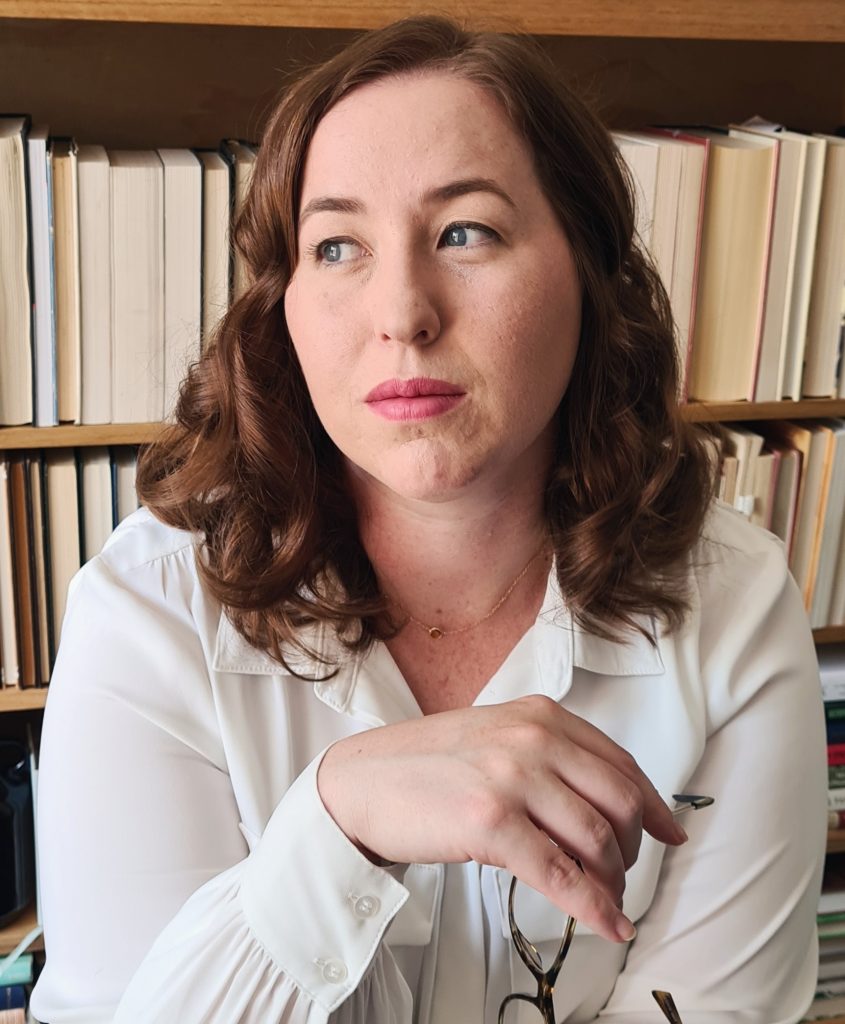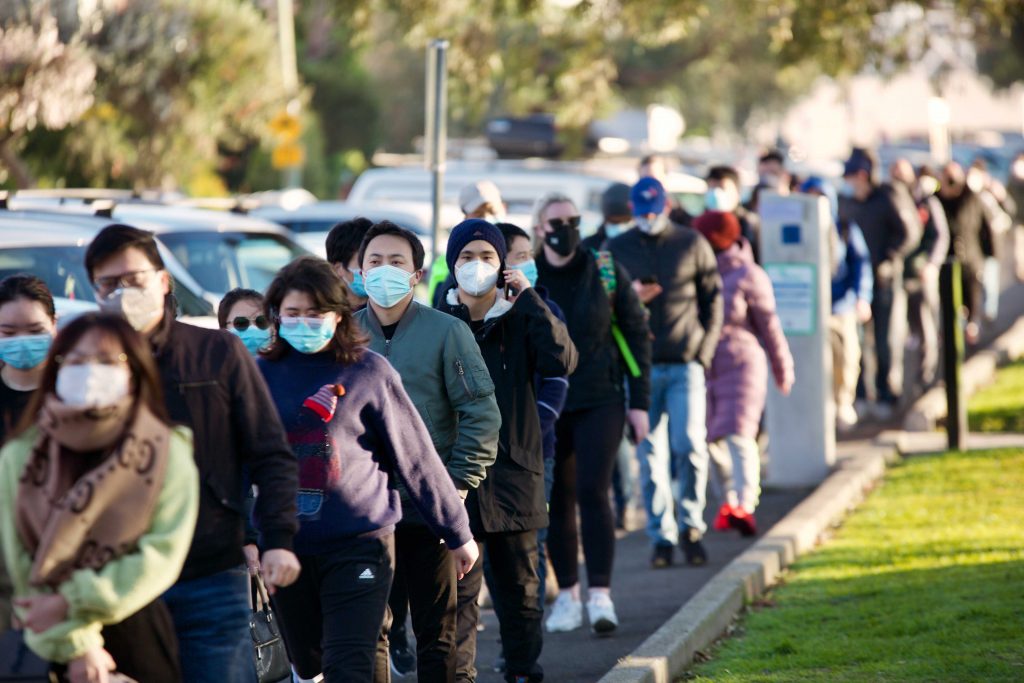While most of us see the COVID-19 pandemic as a healthcare crisis, extremists around the world have sought to exploit the global disruption to serve their own strategic means. But what implications have COVID extremists had on our communities and sense of security? And what can we do to reduce any threats? Charles Sturt academics Kristy Campion and Jamie Ferrill undertook extremism research to provide insight into exploitation of the COVID-19 context and what this means for Australia’s national security.

Dr Kristy Campion, Charles Sturt senior lecturer in terrorism studies.

Dr Jamie Ferrill, Charles Sturt discipline lead and senior lecturer in financial crime studies.
Extremism research shedding light on COVID bad actors
Through a Charles Sturt research study, Kristy and Jamie examined the Australian security context to better understand how extremists were responding to the pandemic.
“When we began this study we expected to see a significant amount of lethal violence associated with COVID-19 countermeasures. While there were such acts and attempted acts overseas, it soon became apparent that it was the changing (or reinforcing) of extreme ideas which would likely have a major impact on the national security landscape for years to come.
“We genuinely wanted to understand if or how extremists were taking advantage of the context created by COVID-19. There were indications that this was potentially happening – especially overseas – but we wanted to really understand the threat posed by these extremists in the Australian national security landscape.
“We found that primarily the extreme right and Salafi jihadists used COVID-19 to their advantage to serve their own ideological interests. It provided a context to reinforce, diversify, and integrate certain conspiracies within their narratives.”
COVID extremists during the pandemic
As Kristy and Jamie have highlighted, many extremist groups have used the pandemic to research, recruit and network.
“Different sorts of extremists have used the pandemic in different ways. For terrorists associated with major groups like Boko Haram and Islamic State, it has been an opportunity to recruit. In other more complex situations, terrorist groups have stepped into humanitarian roles. In Australia, it has allowed extremists to expand their reach, recruit, and network among each other – all while selling their ideologies to people upset about countermeasures.
“Some extremists have exploited misinformation that has been circulated in the mainstream about the pandemic – by leveraging this, they seek to widen the divide between the government and the people through degrading trust.
“The extreme right for example used the COVID-19 context to spread their narratives via protesting or opposing countermeasures. Various factions of the extreme right were also able to diversify by mingling with each other. It enabled them to establish more of a footprint.
“They were seemingly able to exploit community anxiety about COVID and associated countermeasures. We saw this when looking at idiosyncratisation – or where extremists were integrating conspiracies with their ideological affiliation. Extremists used the conspiratorial belief spreading about things like 5G causing COVID to degrade trust in government-backed initiatives like mask mandates. They want to undermine that state intervention.”
Extremism research into dangerous groups in Australia

Extremist groups on Australian soil have taken advantage of the pandemic’s disarray. They’ve seized the opportunity to promote their own ideologies and strengthen their networks.
“Within the Australian context, government orders provided another pathway for extremists to exploit. We found overall that extremist groups (primarily extreme left and Salafi jihadist) used such public health orders to spread their narratives, diversify, and connect with others who either are already extremists themselves or are vulnerable to recruitment.
“There are many extremist groups – proscribed and otherwise – in Australia during the pandemic. Most are associated with the extreme right or violent Salafi jihadists. It is likely we will continue to see new groups emerge on the basis of networks that have formed during the pandemic. Extremists are deeply engaged with current events. We also looked at this engagement before COVID-19 and found that they were engaged with current events even then. COVID-19 countermeasures just became another grievance through which they could sell their ideology.
“We looked at the extreme right, extreme left, and Salafi jihadism. However, data specific to the extreme left was limited in terms of COVID-related activity. Throughout the COVID pandemic, we found instances of extreme right and Salafi jihadist exploitation of the context.”
Extremism research highlights the role of ideology
Ideology became an important factor in the research study. It helped in their extremism research to make sense of the link between thought and action, as Jamie and Kristy explain.
“Ideology essentially shapes and regulates behaviour. It is the lens through which an individual sees the world and their place in it. If an individual’s ideological worldview suggests that they are under threat, they may be more likely to justify extreme behaviour in defence against that threat – whether real or imagined.
“Extremists are able to spread their ideology – in part – through undermining others. Government mandates and public health orders provided another vessel for them to degrade public trust in government institutions and mandates. This cleared a path for them to spread their own beliefs.
“Ideologies help people to map out and make sense of their social world. They shape practice and are reproduced through discourse. Ideologies organise shared social representations. They are the basis of discourse amongst group members. They allow an alignment of actions and interactions with group goals. In the context of extremist ideology, this of course means that their practices, social representations, discourse, and actions and interactions are aligned with just that – extremism.”
Lessons learned from COVID extremists

So what can we learn from COVID extremist behaviour and activities during the pandemic?
“We learned that we must expect extremists will closely engage with crises – whether they are bushfires or pandemics. The impact of that engagement may lead to new security challenges into the future. And that when given the opportunity to take advantage of a crisis, extremists will likely take that opportunity.
“COVID-19 has highlighted the role of trust and reliable information during crises – a critical consideration in national security moving forward is how to prevent the spread of misinformation which works to degrade trust in institutions and governments. This is easier said than done, given that we have observed instances around the world of misinformation being peddled by political voices.
“The idea that there is diversification occurring is a really significant threat to national security – amongst our other findings. When traditional white supremacists are adopting sovereign citizen movement ideas on government oppression, for example, it certainly is cause for concern about the fluidity and adaptability of these groups. They’re exposed to different ideas, goals, and people, which means the threat could really inflate. So, firstly, old ideologies reinforced, and secondly, new ideas and ideological affiliations emerge.”
How you can make a difference

There are some simple ways that you can help to counteract extremism online.
“People can make a difference by engaging with scientifically backed information – whether that is social sciences, pure sciences, etc. Misinformation has been rife during the pandemic. In a world where we are overloaded with information every day, it is difficult to know what to believe. This isn’t only relevant in the extremist landscape; rather, everyone has a responsibility to ensure the validity of what they are sharing and promoting. With that, I think cyber roles are going to become more in-demand as the world continues on its current trajectory.”
“One of the biggest contributions that people can make is by using reliable information. And not being afraid to point out information which is not reliable. Check the source before you share, retweet, or like a story – or report a story if you think it contains misleading information. Misinformation only gains power when it is magnified. So we can all contribute to an atmosphere of trust by promoting information which is reliable and from authoritative sources. Beyond that, misinformation and extremist content remain a complex problem.”
How to play your part in the future of Australia’s national security
Our Charles Sturt experts have some wise words of advice for those who want to make a difference to Australia’s national security
“Expect the unexpected. Our knowledge of terrorism and extremist threats is constantly growing, evolving and changing. Part of this change is due to the growth of experts in the field. Moreover, the extremists are constantly innovating. They are looking for ways to change what they do to get what they want. We need to be proactive with respect to those developments.
“Threats to national security – extremist, economic, cyber, etc. – are constantly evolving. Those that are threatening the security landscape try to stay steps in front of those that are trying to interdict them. So my advice is to always think ahead to the next threat while understanding what the current landscape looks like. Consider what skills you possess that can contribute to making Australia safer.”
Prepare yourself for in-demand jobs of the future. You can help protect Australia’s national security with an industry-aligned terrorism and security studies, fraud and financial crime, or cyber security degree.
Help make the world a better, safer place.


You must be logged in to post a comment.